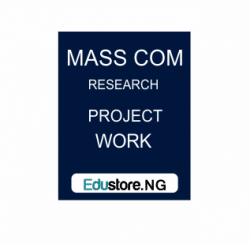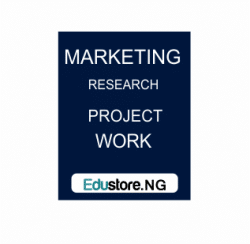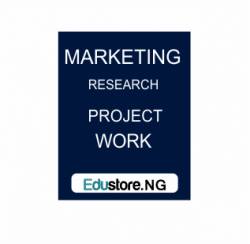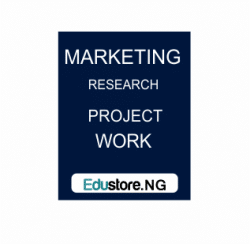The impact of internet marketing on insurance service
ABSTRACT
In the current era of technological advancement, people want to have information instantly. In their busy schedule, they want to take purchasing decision instantly. Marketing managers of different companies also takes advantage of technology for selecting right client for their different class product with right strategies. Internetization of marketing helps them to identify all the parameters that affects decision making of the customers. In this study, consumer’s attitude towards the various aspects of internet marketing of health insurance product has been analyzed. The study also explores the changing nature of the attitude of consumers with respect to their demographic profile.
CHAPTER ONE
INTRODUCTION
1.1 BACKGROND OF THE STUDY
In the last few decades, internet has significantly changed the way of communication, sharing of information and business advertisement strategy. World Wide Web enables us as a consumer and as manager of any firm to participate in the global virtual marketplace (Kothari & Saxena, 2004). This leads to innovative and effective way of marketing with respect to not only for the sellers but also for the buyers of any product. In the present ear of technology, digital marketing plays a significant role in the marketing of any product. Digital marketing or Internet marketing is not become more efficient than the traditional marketing. However, the effectiveness varies with the variation of the nature of the products, target customer, the market structure and many more. According to the report of PWC (2012) titled “Life Insurance 2020: Competing for a future”, (Yoder, Rao, Bajowala, & Sunder, 2012) almost 50 per cent respondent agreed with the view that internet marketing has changed their way of selection and purchase of insurance plans. The resent development of Big-Data Analysis, Search Engine Optimization, Google Analytics and many more makes the strategies of digital marketing much more effective. N. Kink and T. Hess in their study proves that the consumers are font of using search engines rather than the traditional source of information (Kink & Hess, 2008, pp. 18-29). A study based on 12 Indian market of Tire I and Tire II cities reported that around 40 per cent consumers researched online to make purchasing decision (Nielsen, 2020).
Digital Marketing
Digital marketing is the concept of promoting the product (good and services) over internet (Hanson & Kalyanam, 2007). The concept is synonymously used as web marketing, Internet marketing, e-marketing, e- ecommerce or e-business. As the cost of using internet is reducing day by day, more and more people become the user of internet and they developed themselves digital communication savvy. They are linked with different social media; they are becoming more and more techno savvy in terms of getting and comparing information regarding the product, purchasing products or using any services. The corporates – either private or public has also use digital communication technology as their marketing channel. This channel includes websites, social networking sites, YouTube, online communications, email, mobile phones etc. The channels have the capability to find target audience, track the various e-marketing (Salehi, Mirzaei, Aghaei, & Abyari, 2012).
Health Insurance Product and Digital Marketing
Insurance services, more specifically health insurance services are intangible, inseparable, heterogonous and perishable in nature and hence the marketing of such services digitally effects differently than that of tangible product. G. Radha Krishna, in his book, “Marketing of Insurance Services in India” has discussed the changing scenario of the marketing strategies of health insurance industry (Radha Krishna, 2008). The paradigm shift of the nature of marketing from traditional agent-based marketing to e-marketing, digitalization of information of the product in this sector is become the emerging trend not only exists in the private sector but also in the public sector.
1.2 STATEMENT OF PROBLEM
The effectiveness of digital marketing on different tangible product categories like bike, car, consumer durable products, fashion accessories, and many others has been analyzed by different researcher in different part of India and abroad, but the product like health insurance policies, which are intangible, inseparable, heterogonous and perishable in nature, has not been researched in details, especially in the context of Indian health insurance sector.
The situation is more disturbing and worrying when compared with what other developing and developed countries have been able to achieve with their insurance companies (Basil, 2011).
However, with all the problems above which plaque the insurance company sub-sector in Nigeria, there is need for a good marketing skill. This is due to the fact that the world is become a global village. The appearance on the scene of the Internet, especially Web 2.0, and the social networks is challenging the levels of power and influence of the agents who build brand image. With the extraordinary power of propagation of these messages on the Web, customer opinions, recommendations and complaints are increasingly the determining factor in creating brand images. The result is that brands are clearly been built bi-directionally. Decisions are made based not only on messages sent by companies to their customers, but technology is making it easier for people to converse. Thus a transfer of power is witness from companies to their consumers. Consumers‟ final decisions to buy are therefore largely based on recommendations from others who have already bought or used the products or service in question, and who share their buying and consumption experiences on the Internet. This phenomenon is taking off at a phenomenal rate, and for many consumers pages like Tripadvisor and Ciao have already become essential pre-purchase references. In this kind of environment, a skilful management of the brand experience seems to be one of the key factors for brand success. Only satisfied customers will give us positive recommendations in these virtual environments, which then favorably influence the decision to buy of our customers who consult these platforms.
At the same time, another key success factor in this cut-throat environment is the development of effective strategies for influence and communication on Web 2.0 and the social networks. Unfortunately, many companies are clearly still in denial and failing to adopt pro-active strategies for an Internet presence. Some earmark a percentage of their communications investment for the Internet, but with no overall idea of what the medium can offer them, or of how a web presence must be integrated with other brand communications. Too many companies are still trying to control public network conversations on their brands, and too few are dedicating.
1.3 OBJECTIVES OF THE STUDY
The main objective of the study is to examine internet marketing as a key driver of sales improvement in insurance services in Lagos Metropolis.
The sub-objectives of the study are to:
- Explore the relationship between the forms of internet marketing (email, search engine, online advertising and blog) and sales improvement of insurance services in Lagos metropolis.
- Examine the effects of the implementation of internet marketing on the performance of insurance services in Lagos.
- RESEARCH QUESTIONS
- What is the impact of internet marketing on sales growth of insurance services in Nigeria?
- What are the challenges of internet marketing experienced of insurance companies in Lagos, Nigeria?
- RESEARCH HYPOTHESIS
H1: There is no correlation between internet marketing and sales improvement of insurance services.
1.6 JUSTIFICATION FOR THE STUDY
Insurance services play a vital role in the economy of Lagos State in particular and to the Nigerian economy in entirety. Insurance industry contribute to the gross domestic product of the state, and also serve as the platform of minimizing the rates of unemployment in the land, as it allows individuals to be job owners and creators.
It is highly believed that this study through its findings and policy recommendations would be useful to micro, insurance services, investors, business analysts, financial institutions, non-financial institutions, stakeholders in the corporate world and government through its agencies such as ministry of trade, industry, investment and commerce. It will also be beneficial to future researchers that intend carrying out studies in this regard.
1.7 SCOPE AND LIMITATIONS OF THE STUDY
The study examined internet marketing as a key driver of sales improvement of insurance services with strong emphasis in Lagos metropolis. The limitations encountered during the course of carrying out the study include control limitation, time limitation and financial limitation.
Control Limitation- The researcher was limited to carrying out the study in Lagos metropolis based on the directives of the project supervisor.
Time Limitation- The time allocated to the researcher to carrying out this study was relatively short, given other academic commitments.
Financial Limitation- As a result of paucity of fund, the researcher was unable to sample Insurance companies across the length and breadth of the metropolis.
Inspite of these stated limitations, a robust, quality and fact-finding research was carried out.
1.8 KEY DEFINITION OF TERMS
Marketing: It refers to the communication between a person (sales person) and his actual or prospective customers with the aim of selling ones product or service to them.
Internet Marketing: it refers to the use of electronic devices and tools to create to communicate to actual or prospective customers of a firm with the aim of selling ones product or service to them.
Sales: The exchange of a commodity or money as the price of a good and services.
Sales Improvement: This refers to a significant increase in the level of firm’s sales.
DOWNLOAD COMPLETE WORK
- For Reference Only: Materials are for research, citation, and idea generation purposes and not for submission as your original final year project work.
- Avoid Plagiarism: Do not copy or submit this content as your own project. Doing so may result in academic consequences.
- Use as a Framework: This complete project research material should guide the development of your own final year project work.
- Academic Access: This platform is designed to reduce the stress of visiting school libraries by providing easy access to research materials.
- Institutional Support: Tertiary institutions encourage the review of previous academic works such as journals and theses.
- Open Education: The site is maintained through paid subscriptions to continue offering open access educational resources.






